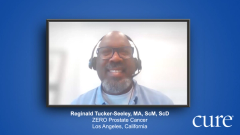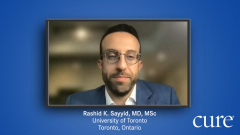
Treatment Options for Nonmetastatic CRPC
Rashid K. Sayyid, MD, MSc, gives a brief overview of treatment options for nonmetastatic castrate-resistant prostate cancer.
Episodes in this series

This is a synopsis of an Educated Patient Sound Bites series featuring Alicia Morgans, MD, MPH, of Dana-Farber Cancer Institute; Rashid K. Sayyid, MD, MSc, of the University of Toronto; and Reginald Tucker-Seeley, MA, ScM, ScD, of ZERO Prostate Cancer.
Dr Rashid K. Sayyid defines nmCRPC [non-metastatic castration-resistant prostate cancer] as evidence of castration resistance without metastases on CT or bone scan. He notes recent progress in nmCRPC treatment, with FDA approval of second-generation antiandrogens apalutamide, enzalutamide, and darolutamide along with continued androgen deprivation therapy (ADT). Approvals were based on the phase 3 ARAMIS, PROSPER, and SPARTAN trials respectively.
The ARAMIS trial randomized patients with nmCRPC with rapidly rising prostate-specific antigen (PSA) to darolutamide or placebo plus ADT. Metastasis-free survival increased from 18 to 40 months with darolutamide, reducing death risk by 31%. Similarly, the PROSPER trial using enzalutamide improved metastasis-free and overall survival by 11 months. Finally, the SPARTAN trial with apalutamide extended metastasis-free survival by 2 years and overall survival over 1 year.
In summary, Dr Rashid K. Sayyid reviews recent progress in treating non-metastatic castrate-resistant prostate cancer with second-generation antiandrogens apalutamide, enzalutamide, and darolutamide. The phase 3 ARAMIS, PROSPER, and SPARTAN trials supported FDA approval.
*Video synopsis is AI-generated and reviewed by CURE editorial staff.







